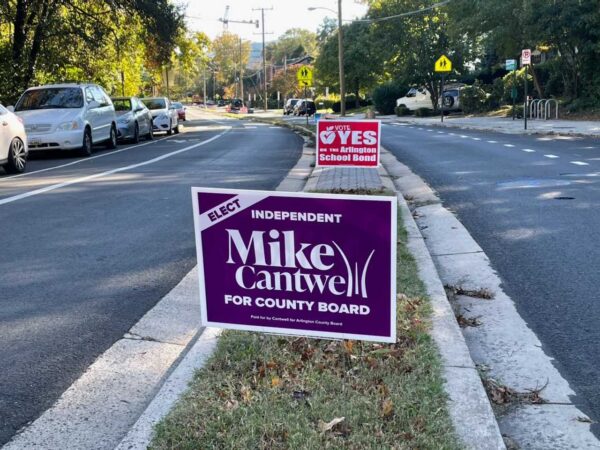
On the eve of Election Day, some of Arlington’s candidates are hopeful that this election cycle will bring a refresh to local politics, even while history suggests otherwise.
This year, four candidates are vying for one seat on the County Board — including three independents — and two candidates are competing for a seat on the School Board.
On the County Board side, Democrat incumbent Takis Karantonis is competing to keep his seat against Mike Cantwell, Audrey Clement and Adam Theo, while for the School Board, Mary Kadera and Major Mike Webb are running for the seat of outgoing member Monique O’Grady.
Independent candidates for the County Board in particular say the loaded independent slate could be a good thing for local discourse. Karantonis was not available to respond to a request for comment.
“The independent candidates brought new ideas and fresh perspectives this year’s election,” Cantwell said. “Arlington voters want change. They know instinctively that one party rule is bad for democracy and bad for Arlington. They want to vote for someone who is free from partisan ties and conflicts of interest.”
Adam Theo also praised the ratio of four candidates to one County Board seat.
“I hope to see every race in the future be this competitive and hopefully even more diverse,” he said. “I’m well aware that despite the competitiveness, unfortunately all four candidates are middle class white people. Although there are some good policy differences among us… we could have even more differences in policy solutions with greater gender, racial, ethnic, and religious diversity in our candidates.”
But perennial candidate Audrey Clement was more pessimistic.
“While I am impressed with the professionalism of Arlington’s election operations, I am profoundly disappointed that the vast majority of voters are fixated on one thing — the blue ballot,” Clement said. “That voters will not consider an alternative to the current Democratic Party machine guarantees corrupt government and ever escalating taxes for the foreseeable future.”
Independent and Republican candidates typically are resoundingly beaten out in Arlington elections, which favors establishment Democrats. Last year, 80.7% of voters voted for Joe Biden and 71.6% voted for incumbent Democrat Libby Garvey. Karantonis himself won his 2020 special election in a landslide, and likewise won the Democratic primary in June with a two-thirds majority.
Despite Arlington’s deep blue streak, Clement praised “the robust turnout for the six virtual candidate debates” she attended.
Clement also responded to the recent controversy over misrepresenting her age in a Washington Post candidate questionnaire, comparing age discrimination to racial discrimination 50 years ago.
“I maintain that all those over age 40 are in a federally designated ‘protected class’ that bars discrimination against them on the basis of age,” she said. “That means that they cannot be compelled to divulge their age except for an overriding government purpose.”
Overall, the independents say they’re happy with the campaign they led.
“I always spoke the truth and treated everyone with respect,” Cantwell said. “Because I am a true independent, I listened to all voters, not just the voters on Team Blue or Team Red.”
Theo says he didn’t set hard exceptions for himself this year, since he was focused on warming up to debates and introducing himself to voters. He says this year prepared him for future races, when he hopes to repeat the 2014 upset that landed John Vihstadt a spot on the County Board.
“I’ve now set up everything I’ll need for a future run in 2023 or 2022,” he said. “I go into a future race better positioned and prepared than any other independent candidate since John Vihstadt in 2014, I believe.”
Meanwhile, education is an increasingly hot-button political topic in Arlington and across Virginia. Division has seeped deeper into local Arlington school politics, says Democrat-endorsed School Board candidate Mary Kadera.
“To some extent public education has always been political, but this year more so than others,” she said. Her opponent, Mike Webb, was not available for comment.
This year, school choice, school curriculum and COVID-19 safety measures such as mask requirements have made education a hot-button issue in Virginia elections, she says.
“Local school board races are by Virginia law nonpartisan, but that doesn’t mean local school districts aren’t affected by education policies and investments made at the state and federal levels,” she said. “I am hoping all voters will examine the candidates’ education platforms carefully because it’s such a significant time for our students and staff, who need our full support as schools have reopened and we’re doing the important work of recovery.”
Meanwhile, voters will also be able to cast ballots in favor or against about $86 million in local government bonds.
On the county side, that includes components of the county’s three year Capital Improvement Program, adopted in July 2021, and focuses on transportation, local parks and community infrastructure spending. On the schools side, an Arlington Public Schools bond measure that would pay for renovations to existing and the construction of new school infrastructure as part of its Capital Improvement Program.
The school bond includes $11.6 million in building refreshes and kitchen renovations at Campbell, Drew, Randolph, Long Branch and Hoffman-Boston elementary schools as well as Swanson and Kenmore middle schools and the Langston High School Continuation Program.
It also includes the $11.4 million second phase of the new The Heights building.
“I’m pleased to see that this year’s school bond includes important funding for more secure entryways to our schools, improvements to several school kitchens and accessibility improvements at The Heights building for students with disabilities,” Kadera said.
Early voting totals were 40,219 as of Sunday, according to Arlington’s voting dashboard, which was last updated today (Monday). That’s more than three times what they were in the last gubernatorial election, through Nov. 7, 2017: 12,480.
Overall, as of Sunday, 27,790 people voted early and in-person, and 12,429 people submitted mail-in ballots.

